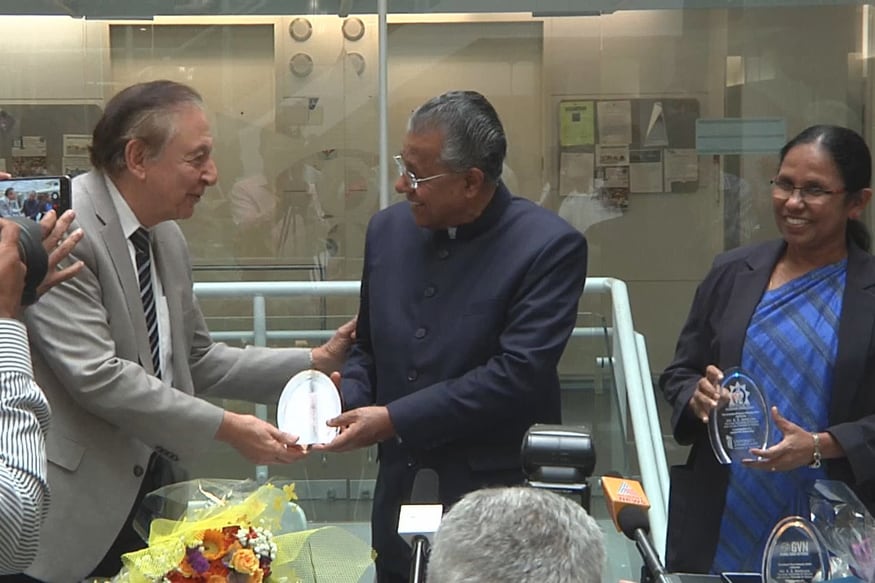HIV Blood Test Creator Likely to Work With Kerala After Govt Wins Global Praise for Containing Nipah Virus
Robert Gallo, who co-discovered HIV as the cause of AIDS and created HIV blood test, felicitated Kerala chief minister Pinarayi Vijayan and health minister K K Shylaja on Saturday for successfully curbing the nipah virus.

Kerala chief minister Pinarayi Vijayan along with HIV virus co-discoverer Robert Gallo in Thiruvananthapuram (News18)
Thiruvananthapuram: State government’s effort to contain nipah virus has drawn international attention with HIV virus co-discoverer Robert Gallo looking for prospects to work with Kerala in the field of research.
Gallo, who co-discoverer of HIV as the cause of AIDS and creator of the HIV blood test, felicitated Kerala chief minister Pinarayi Vijayan and health minister K K Shylaja on Saturday for successfully curbing the virus.
The scientist honored the leaders on behalf of Institute of Human Virology in United States’ Baltimore. He is the co-founder of the institute.
Nipah virus had hit the northern districts of Kozhikode and Malappuram, claiming 17 lives. The two districts were declared nipah virus-free on June 30.
Vijayan and Gallo discussed the prospects of working with Kerala in the field of research. The state is already setting up an advanced virology institute in Thiruvananthapuram.
“This is an honour for the public health system of Kerala. The state lays a lot of emphasis on public health system. We believe that a healthy population is the foundation to growth,” the chief minister said.
Speaking on government’s efforts to control the virus, the CM said, “It is a matter of pride that Kerala was able to confirm nipah virus from the second patient itself. We could identify all the people who came in close contact with the first person and put them under surveillance. Those who showed symptoms were moved to isolation wards.”
Vijayan added that even before confirming the virus the health system was alert and once confirmed, all government machinery moved together.
About 2,000 people were put under surveillance and the synchronised efforts helped to control the virus from spreading to a larger area.
Gallo, who co-discoverer of HIV as the cause of AIDS and creator of the HIV blood test, felicitated Kerala chief minister Pinarayi Vijayan and health minister K K Shylaja on Saturday for successfully curbing the virus.
The scientist honored the leaders on behalf of Institute of Human Virology in United States’ Baltimore. He is the co-founder of the institute.
Nipah virus had hit the northern districts of Kozhikode and Malappuram, claiming 17 lives. The two districts were declared nipah virus-free on June 30.
Vijayan and Gallo discussed the prospects of working with Kerala in the field of research. The state is already setting up an advanced virology institute in Thiruvananthapuram.
“This is an honour for the public health system of Kerala. The state lays a lot of emphasis on public health system. We believe that a healthy population is the foundation to growth,” the chief minister said.
Speaking on government’s efforts to control the virus, the CM said, “It is a matter of pride that Kerala was able to confirm nipah virus from the second patient itself. We could identify all the people who came in close contact with the first person and put them under surveillance. Those who showed symptoms were moved to isolation wards.”
Vijayan added that even before confirming the virus the health system was alert and once confirmed, all government machinery moved together.
About 2,000 people were put under surveillance and the synchronised efforts helped to control the virus from spreading to a larger area.